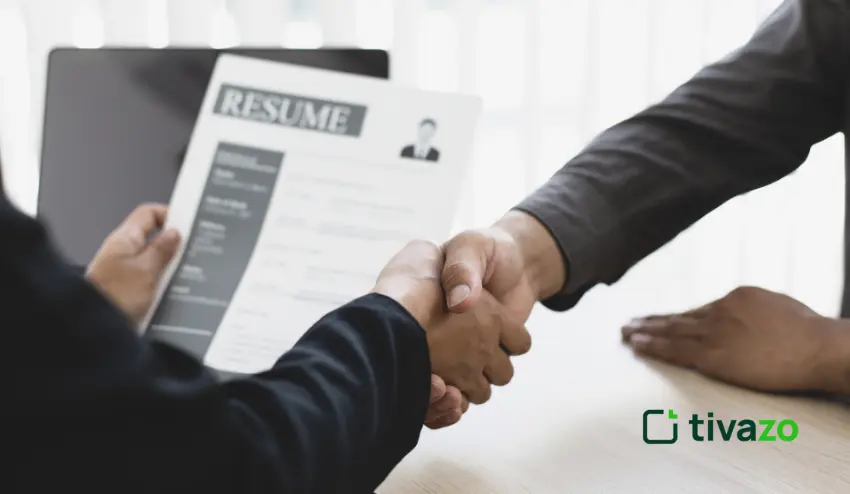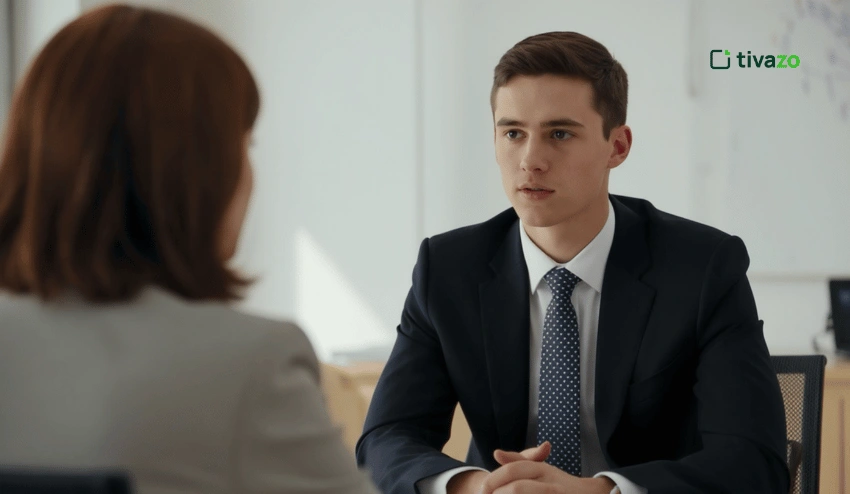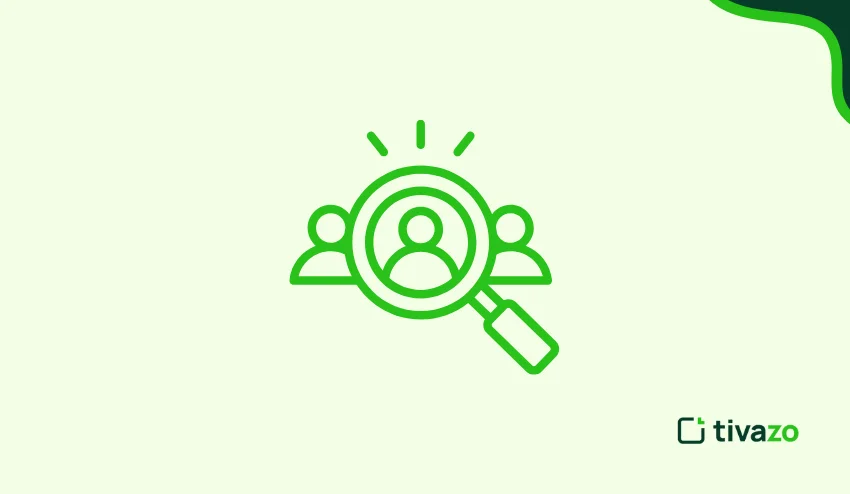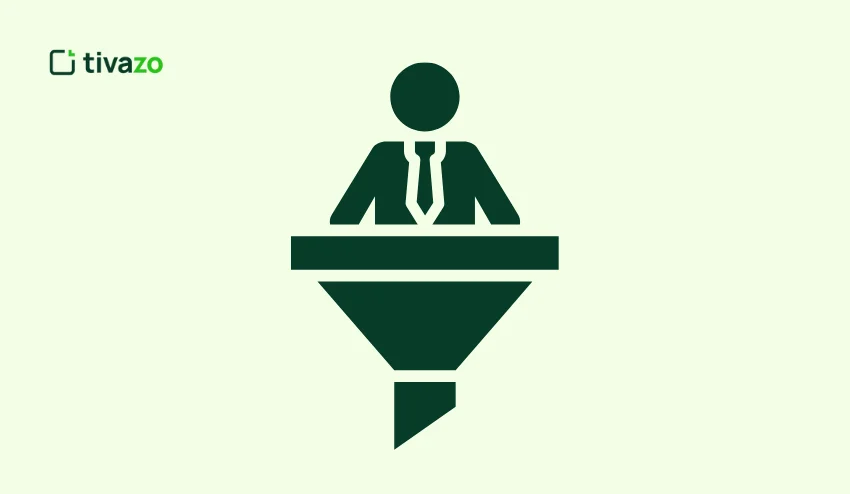You have passed the phone interviews, the technical interviews, and the behavioral interviews. You are now at the final interview-the last obstacle between you and the job offer. Each answer counts at this point. The questions are deeper and your competition is sharper.
In this guide, I will take you through 20 final interview questions, the reasons why they are asked and how to answer them. You will also receive tested preparation methods, sample answers and intelligent questions to ask the interviewer. These tips will help you bag the offer whether you are just about to get your first job or you are making a career change.
Key Highlights:
- What Is a Final Interview?
- Who Is a Final Interview With?
- Importance of Final Interview Questions
- 20 Examples and Categories of Final Interview Questions
- How to Prepare for the Final Interview
- Additional Tips to Win the Offer
- Final Interview Questions to Ask the Interviewer
What Is a Final Interview?

A final interview is the final step of the hiring process. It is where employers are guaranteed of the right choice. You have already proved that you meet the technical skills requirement but now they want to know whether you will be able to fit in their company culture, long term goals and team dynamics.
This is not another interview round, but a strategic conversation which is concerned with:
- How you can add value to the job description.
- Your approach to decision-making, conflict, and leadership.
- Whether your career story fits into the vision of the company.
Consider it as the due diligence of the employer prior to their investment in you. Next, let’s look at who will be in the room.
Who Is a Final Interview With?
The last interview is usually conducted by hiring managers, senior executives, department heads or even the founder of the company. With bigger organizations, you might encounter a panel comprising of HR, your prospective manager, and cross-functional team members.
When meeting with hiring managers: Be prepared to be asked specific questions regarding your previous projects, problem solving abilities, and your willingness to begin.
With executives: You will be asked about your vision of the long-term, leadership style, and your representation of the company.
With peers: They can inquire about teamwork, communication, and your role in work-life balance in a team.
Having an idea of who you will meet will enable you to prepare appropriate examples. This leads us to why final interview questions are so important.
Importance of Final Interview Questions
By the time you get to the final round you are already one of the top 2-3 candidates. It implies that there is little room to make mistakes and the interviewers are seeking reasons to hire you- or to get rid of you.
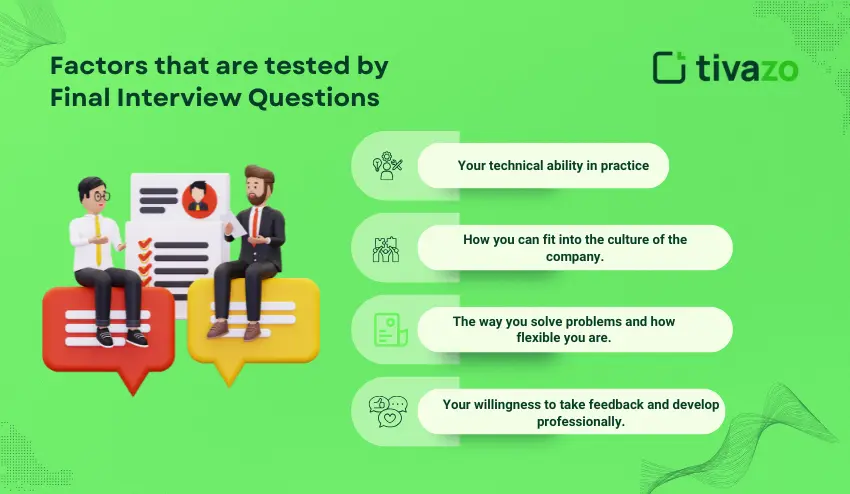
Final interview questions are important since they are used to test:
- Your technical ability in practice.
- How you can fit into the culture of the company.
- The way you solve problems and how flexible you are.
- Your willingness to take feedback and develop professionally.
For example, when you are asked to describe a situation when you had to lead a project with strict deadlines, the interviewer is testing whether you are able to handle pressure, communicate, and at the same time deliver results, which is a skill that is important in project management or fast-paced jobs.
With that in mind, let’s break down 20 examples you might face.
20 Examples and Categories of Final Interview Questions
I’ve grouped these questions into five categories so you can prepare holistically.
1. Final Interview Questions About Role Fit & Leadership Potential
These final interview questions indicate whether you are able to manage projects, take decisions in a stressful environment, and generate quantifiable change. Show how your past experience and skills match the job requirements with examples of real life.
- Tell me about a project you managed in a short time frame.
Present a scenario in which your leadership and project management capabilities had a direct effect. To make your answer organized, use the STAR method. - What are some special skills or experiences that make you the best person to fill this position?
Emphasize the most appropriate skill set and previous experiences. Do not give generic responses-look at quantifiable impact. - What do you do when there are competing priorities?
Employers would like to know your decision-making model, be it impact vs. urgency, data-driven, or consensus-driven. - How would you plan in 30-60-90 days should you be hired?
A good plan demonstrates that you are proactive, well-organized, and prepared to get going.
2. Final Interview Questions About Culture Fit & Behavior
Employers are interested in whether you will fit in their corporate culture. They will want to know how you deal with feedback, work life balance, and what motivates you. Your responses indicate how you will fit in the team and ask you Final Interview Questions accordingly.
- What are your values and how do they match ours?
Refer to their mission statement and give personal examples. - Tell me about an occasion when feedback made you better.
This shows that you are coachable and appreciate constant development. - What do you do to manage work and your own life?
Connect your response to the ability to balance work and life and still produce. - What keeps you going when you are faced with a difficult project?
The interviewers would like to know that you are driven by more than a paycheck.
3. Final Interview Questions About Problem-Solving & Technical Skills
These questions are your technical and problem solving skills in practice. You can anticipate being asked how you have addressed difficult problems, how you have managed changing priorities, and how you have applied tools such as project management software to increase efficiency.
- Take me through a technical problem you have solved.
Select an example that demonstrates both technical ability and imaginative thought. - What do you do when everything is urgent?
Talk about systems such as the Eisenhower Matrix or agile sprint planning. - Give me an example of a process that you have refined through software or automation.
Share details in case you have introduced project management software. - Tell me about a project you learned something on failure.
Employers appreciate resilience and the capacity to learn out of failure.
4. Final Interview Questions About Logistics & Practicalities
In this case, the emphasis is on the practical aspect: when you can start working, what salary you suppose to get, what benefits package you want to have, and how flexible you are in the relocation. Realistic answers, which are clear, assist the employer to plan the next steps.
- What is the earliest you could take the job?
Be realistic about notice periods and have a definite start date. - What do you expect to be paid?
Use research to base your answer and be prepared to negotiate salary range. - Which benefits are of the greatest importance to you?
Talk about the benefits package that suits your lifestyle such as healthcare or flexible work hours. - Would you move to another place?
Tell the truth but be open-minded.
5. Final Interview Questions About Questions to Ask the Interviewer
The last interview will be your last opportunity to ask probing questions. You should ask about the measures of success, the possibilities of growth, the future, and how the company encourages work-life balance.
- In six months, how will this job be successful?
Demonstrates that you are a forward thinker. - What is the work-life balance in the team?
Assists you in knowing what to expect and culture. - Which big initiatives can I work on during the first year?
Keeps you in line with strategic company objectives. - Is there anything in my background that you would like me to explain?
Allows the interviewer to tackle concerns prior to their decision.
How to Prepare for the Final Interview
- Master the STAR method.
Use the Situation, Task, Action, Result format to prepare detailed responses. Prepare bullet point illustrations of leadership achievements, technical abilities and problem solving situations so you can recall them in the interview. - Research your interviewers.
Find their LinkedIn profiles, company bios or projects that they have recently worked on. Knowing their priorities will enable you to frame your responses in ways that will fit their interests and the current objectives of the company. - Draft a 30-60-90-day plan.
Write a plan of what you would like to achieve in the first month, three months and six months. It is proactive, strategic and ready to make a contribution on day one. - Practice discussing salary.
You should be ready to offer a researched salary range that is industry standard and experience based. Back it up with good reasoning and a little bit of give and take but understand your bottom line. - Prepare your own questions.
Ask intelligent questions regarding the growth opportunities, team culture, or upcoming projects. This indicates that you are not only assessing the company but also the company is assessing you. - Do mock interviews.
Practice with career coach, mentor or even a close colleague. You can also use an AI mock interview and seek honest tips on how to improve your tone, body language and clarity to ensure you deliver perfectly. Seek honest tips on how to improve your tone, body language and clarity to ensure you deliver perfectly. - Close with a confident summary.
Close by repeating why you are a good fit to the job, how you can help and how you are excited to be part of the team.
Additional Tips to Win the Offer
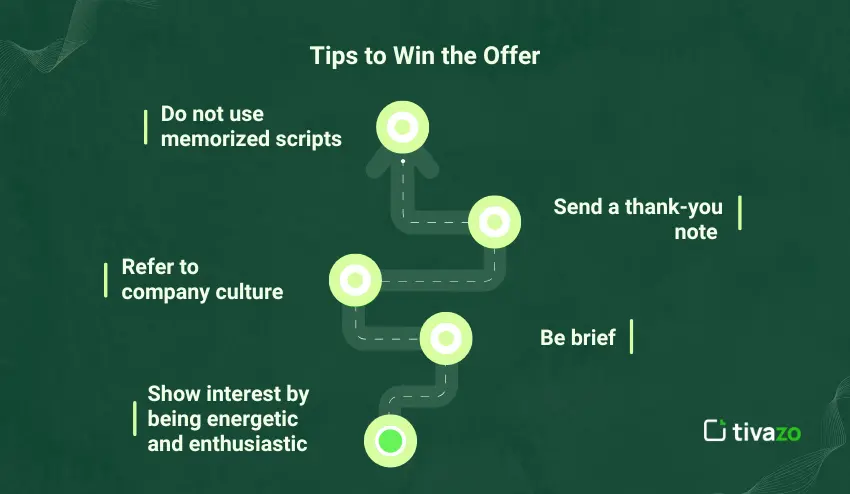
- Show interest by being energetic and enthusiastic – Show interest by being energetic and enthusiastic by using positive body language, an engaged tone and active listening.
- Be brief– Answer questions with clarity and provide sufficient details without losing the track.
- Refer to company culture– Name certain values, projects or accomplishments that resonate with your abilities.
- Send a thank-you note – Within 24 hours, send a brief, personalized email, summarizing the main points of the discussion.
- Do not use memorized scripts– Have talking points but speak in your own voice.
Final Interview Questions to Ask the Interviewer
Your questions may make an impression. Seek those that are curious, strategic, and fit with the company:
- What is my performance going to be measured by?
- What are the growth opportunities in this position?
- What is the role of leadership in helping career moves within the company?
- What are the tools or processes that make your team successful?
Final Thoughts
Making it to the final interview is already an indication that you are a good candidate. The offer can be won by the right preparation and well thought out answers to final interview questions. Be ready to demonstrate your special skills, fit into the corporate culture and show that you can start working on day one.
It is your turn to prepare now. Read through these 20 final interview questions, customize your responses and walk into your final round to win.
